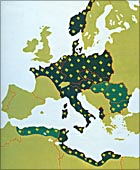| The events that led to the declaration of the Greek-Italian war

 Following an extreme expansionist policy, in the spring of 1939 the Germans occupied Czechoslovakia and the Italians Albania. The placatory stance that had so far been adopted by the western powers (Britain, France) proved ineffecual. In this regard, Italy's official assurances in April 1939 that she did not intend to undertake aggressive acts against Greece understandably did not convince the Greek political leadership. Examining all the possibilties - especially in the light of its declaration of war in September 1939 - British diplomacy concluded that for military reasons it was to its advantage that Greece should be placed outside the war zone. However, the unilateral entry of Italy into the war on 10 June 1940 once more redefined the system of balances in the Balkans.
Following an extreme expansionist policy, in the spring of 1939 the Germans occupied Czechoslovakia and the Italians Albania. The placatory stance that had so far been adopted by the western powers (Britain, France) proved ineffecual. In this regard, Italy's official assurances in April 1939 that she did not intend to undertake aggressive acts against Greece understandably did not convince the Greek political leadership. Examining all the possibilties - especially in the light of its declaration of war in September 1939 - British diplomacy concluded that for military reasons it was to its advantage that Greece should be placed outside the war zone. However, the unilateral entry of Italy into the war on 10 June 1940 once more redefined the system of balances in the Balkans.
In August 1940, Italian aggression against Greece escalated with the torpedoing of the Greek warship 'Elli'.

 The British leadership once more declared its support - albeit without specific commitments - to the government and the people of Greece. In mid-October 1940, at Mussolin's suggestion, the Italian General Staff had worked out a strategic plan for the contingency of invading Greece. A definite date was fixed for the end of October. The connection of Greece and its people with Britain was given out as the moral justification for the proposed plan. When on 28 October Ioannis Metaxas received - and rejected - the Italian ultimatum, he knew that Greece would basically be on its own in its military attempt to withstand the Italian strategy. The course of the 'Battle of Greece', as it was called, had disproportionately wide-ranging repercussions for the continuation of the international conflict, which greatly surprised its enemies and allies.
The British leadership once more declared its support - albeit without specific commitments - to the government and the people of Greece. In mid-October 1940, at Mussolin's suggestion, the Italian General Staff had worked out a strategic plan for the contingency of invading Greece. A definite date was fixed for the end of October. The connection of Greece and its people with Britain was given out as the moral justification for the proposed plan. When on 28 October Ioannis Metaxas received - and rejected - the Italian ultimatum, he knew that Greece would basically be on its own in its military attempt to withstand the Italian strategy. The course of the 'Battle of Greece', as it was called, had disproportionately wide-ranging repercussions for the continuation of the international conflict, which greatly surprised its enemies and allies.
|

